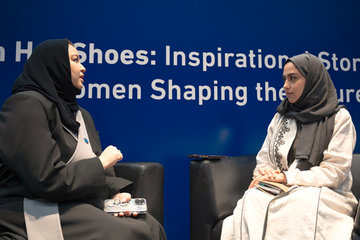
In a bid to empower women in the workforce, particularly when it comes to leadership roles, companies listed in the United Arab Emirates (UAE) are now required to have at least one female board director. This decision came into force after a meeting held by the Securities and Commodities Authority (SCA) at the start of this week, with the goal to meet “the highest global standards,” as stated by the head of the SCA's board and Minister of Economy, Abdulla Bin Touq.
Previously, the SCA aimed to see at least 20 percent female representation in the workforce, but the new policy was decided to help remedy past failures of companies meeting that target goal. In a statement made to The National, SCA's Chief Executive Officer Obaid Saif Al Zaabi stated, "We previously used to accept explanations if there wasn’t compliance, but now we are moving to make female representation compulsory."
Some top examples to help women who are aspiring IT and technology enthusiasts believe the sector is a place where they fit in. #Dubai #IWD2021https://t.co/EX3gzVlsOj
— About Her (@AboutHerOFCL) March 7, 2021
Among the workplaces now implementing this requirement include the UAE's Central Bank and Aurora50, the GCC's first accelerator driving gender balance at board level. Both have signed an agreement to boost gender diversity in the boardrooms, which will enable the exchange of information and establish a pipeline of female talents.
Boosting the number of women at the highest level of the workforce is just one of many goals set by the UAE's 2021 National Agenda, which in the long term aims to make the country an ideal place to work and invest in. Thus far, the UAE now has the highest percentage of women in the workforce in the region, with a World Bank blog post putting that number at 57.5 percent in 2020. However, women currently sit on boards of 28 out of 110 companies on the country’s stock markets and hold only 3.5% of director positions, according to Reuters.
The Female Opportunity Index 2021 Studies Top Female Leadership Around The World: https://t.co/PF4AXjqXdf pic.twitter.com/V8RREQKUhC
— About Her (@AboutHerOFCL) March 7, 2021
Although the World Bank blog post noted that women were still facing social limitations, the UAE government had requested the World Bank Group’s support to introduce further legislative reforms. In fact, this year saw the UAE become the first country in the region to offer paid parental leaves for both male and female employees. In addition, under the leadership of the UAE’s Gender Balance Council, the country has successfully carried out a number of reforms on other existing policies, such as: encouraging equal pay in various industries; amending the Personal Status Law in favor of women finding work in the UAE and abroad; allowing women to be heads of households, like men; introducing legislation on combating domestic violence and criminal penalties for sexual harassment in the workplace; prohibiting gender-based discrimination in employment and dismissal of pregnant women; and removing job restrictions in sectors, such as mining, imposed on women.

















